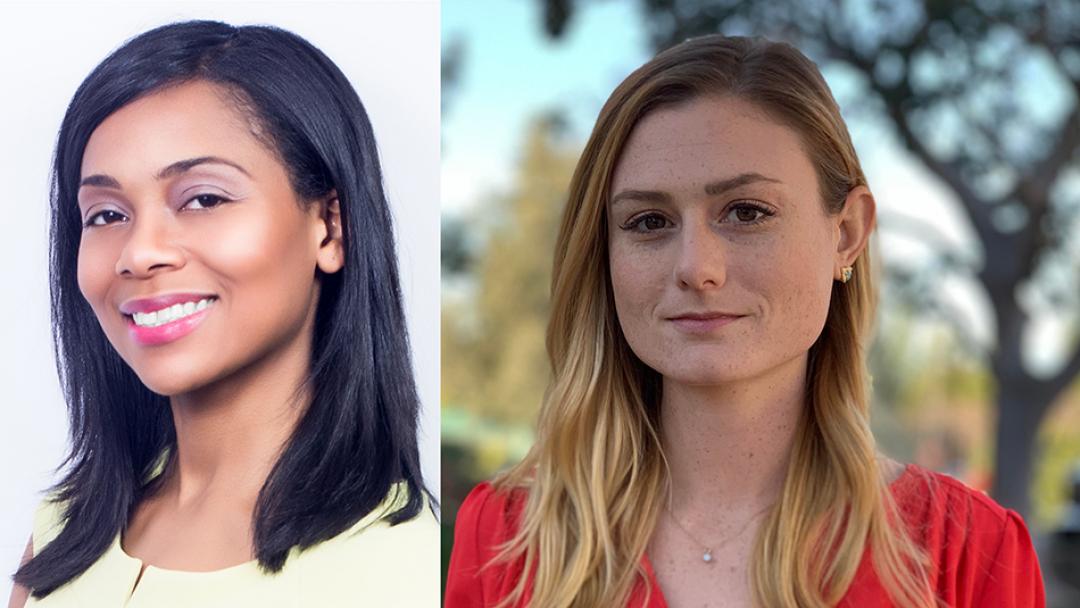
Zayda Sorrell Medina, left, and Melody M. Moore have been awarded Chancellor's Club fellowships.
Ph.D. students Zayda Sorrell Medina and Melody M. Moore have been awarded Chancellor’s Club fellowships
The Chancellor's Club is a community of UC Irvine alumni, parents, faculty and friends. Established in 1972 by founding Chancellor Daniel G. Aldrich, Jr., the purpose of Chancellor’s Club gifts are to support undergraduate scholarships, graduate fellowships, and other areas of critical need as determined by the Chancellor.
Zayda Sorrell Medina
Degrees:
Ph.D. in planning, policy and design, expected June, 2022
M.A. in social work from the University of Pittsburgh, 2012
B.A. in interdisciplinary studies from the University of Missouri, Columbia, 2010
Dissertation: “Measuring the effect of the immigrant-serving third sector on immigrant inclusion outcomes.”
Sorrell-Medina’s dissertation consists of four studies that investigate the relationship between the immigrant-serving nonprofit sector and immigrant inclusion outcomes.
“The first study unearths the mission of the US immigrant-serving third sector,” she notes. “The second identifies the strategies that organizations employ that contribute to immigrant inclusion outcomes and tests whether strategies differ in inclusive and exclusive U.S. cities. The third study measures the effect of the U.S. immigrant-serving nonprofit sector on immigrant inclusion outcomes such as asylum and deportation rates and local government measures. The fourth tests the external validity of the study's hypotheses on Dutch and Austrian samples.”
Results from Sorrell-Medina’s research contribute to the third sector, immigrant nonprofit, and immigration literature. The empirical contribution of her work is that she advances knowledge on the societal impact of nonprofits on regional level immigrant inclusion outcomes, such as asylum and deportation rates and local policy outcomes. She also develops two validated scales that can be used for future empirical testing in the US and abroad. The theoretical contribution of her work is that she addresses the limitations of third sector theories which reveals how they can be refined to be more generalizable across subsectors. The practical implication is that the study sheds light on (in) effective nonprofit strategies that contribute to disparate immigrant inclusion outcomes, which can be useful for nonprofit strategic planning and decision making. The research also has local policy implications regarding diversity and inclusion practices, as part of the study involves measuring the degree to which US cities are inclusive towards immigrants.
Melody M. Moore
Degrees:
Ph.D. in psychological science, expected June, 2021
B.S. in psychology, Texas A&M University, 2015
Dissertation: “Mixed findings for mixed emotions: Reconciliation of the mixed emotion literature via methodological and theoretical advances”
Moore’s dissertation focuses on mixed emotions and the structure of affect.
“Current theories of emotion developed by affective scientists do not reflect the emotional experiences reported by clinical populations,” she notes. “This leaves out large and vulnerable groups, particularly women and people of color. One specific area where emotion theories cannot explain clinical findings is mixed emotions, or states of simultaneous positive and negative emotion (e.g., bittersweet feelings). For decades, clinical psychologists have considered mixed emotions a symptom associated with various clinical disorders (e.g. schizophrenia) and evidence suggests that among patients, mixed emotions are associated with poorer disease outcomes. Nevertheless, affective scientists remain enmeshed in theoretical debate about whether it is possible for people to experience mixed emotions. My dissertation aims to bridge the gap between clinical psychology and affective science by making methodological and theoretical advances in the study of mixed emotions. Ultimately, my goal is to develop more inclusive theories of emotion that can explain changes in the structure of affect.”
Contact:
Mimi Ko Cruz
Director of Communications
(949) 824-1278
mkcruz@uci.edu